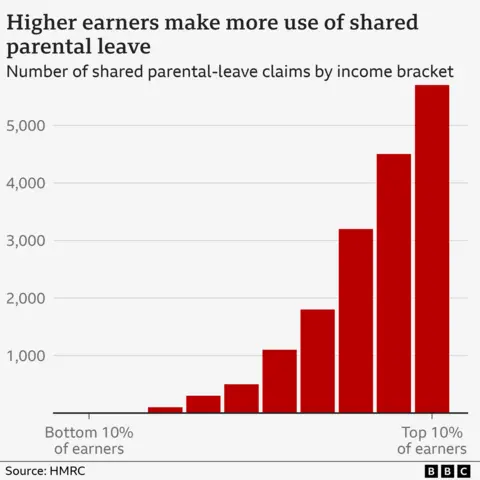Shared parental depart ‘failing working households’

 BBC
BBCA decade on from the introduction of a landmark scheme geared toward serving to new mother and father share childcare, campaigners say shared parental depart is failing the working households it was designed to assist.
As the only real earner in his younger household, 21-year-old Josh Wiborg could not take shared parental depart when his twin women have been born.
Like so many dads, he was entitled to solely two weeks off work, at lowered pay.
He says it left him “feeling like a stranger” to his twin women, Autumn and Winter, within the first few weeks of fatherhood.
“It was terrible,” he says. “My companion was struggling and I used to be struggling as effectively. It simply wasn’t sufficient time.”
Launched 10 years in the past by the earlier Conservative authorities, shared parental depart is a state-funded scheme that enables mother and father to share as much as 50 weeks of depart and as much as 37 weeks of pay after the start or adoption of a kid.
It was hoped this might permit dads to play a extra outstanding position in fatherhood.
However new evaluation, seen solely by BBC Information, exhibits it may not profit all dads equally.
The uptake is closely skewed in the direction of greater earners, predominantly based mostly in London and south-east England.

The figures, from a Freedom of Info request submitted by marketing campaign group The Dad Shift, present the highest 20% of earners make up 60% of these to make use of shared parental depart.
Simply 5% of those that took up shared parental depart got here from the underside 50% of earners.
And since its introduction in 2014, the federal government has paid £40m in shared parental depart funds to households in London – nearly 10 instances greater than within the north-east of England.
“By way of working households, it has fully failed,” says George Gabriel, co-founder of the marketing campaign group.
“There is a huge consciousness hole, there is a complexity downside and there is a problem about most males feeling uncomfortable taking depart off the mom of their little one.”
Fewer than 5% of all eligible fathers use shared parental depart.
Those that have used the scheme are optimistic about its advantages, although.

Pete Goal, from London, took 9 weeks off work to take care of his son, Jay, when the little boy was 9 months outdated.
“It was every thing I’d hoped for,” says Pete, 36.
“We’re nearer than we may have presumably in any other case been.”
However he admits it was a “tough monetary determination”.
As a result of his part of shared parental depart fell outdoors the 37-week window for presidency assist, he wasn’t paid for the time he took off together with his son.
He says “one thing has to enhance” to make sure extra dads can profit.
“I really feel so fortunate that we may afford the monetary hit, [but] it must be virtually attainable for many males to do it.
“We want males to really feel like they’ll take it.”
A government review from 2023 suggests nearly half (45%) of all dads weren’t even conscious of the choice.
As his spouse wasn’t working, Josh wasn’t entitled to shared parental depart and as an alternative took statutory paternity leave, the government-funded scheme that enables dads or secondary care suppliers to take two weeks off after their child is born.
These eligible obtain £184.03 per week or 90% of their common earnings, whichever is decrease.
It meant Josh’s earnings dipped instantly after his twin women have been born.
“I had to return to work [after two weeks] and depart my companion on her personal,” he says.
“I don’t understand how we acquired by it.”
The government has committed to reviewing parental leave throughout its first 12 months in workplace.
It says it desires statutory paternity depart to be a day-one proper for all staff. Presently, it applies to dads who’ve been employed for 26 weeks or extra.
However even with these proposed modifications, campaigners say the UK’s parental depart system is without doubt one of the worst in Europe.
Blair McDougall, a father of two, is one in all a variety of Labour MPs backing The Dad Shift’s marketing campaign for extra beneficiant parental depart.
Whereas he says the federal government is true to “hold one eye on the financial actuality”, he’s in discussions with a gaggle of fellow backbench Labour MPs to debate whether or not future modifications can go even additional than these already outlined.
“Society has moved on however the guidelines round paternity have not,” he says.
“We have to carry these updated to assist fathers be the kind of dads that almost all of us need to be.”
Some companies pay out of their very own pocket to supply enhanced paternity depart and shared parental-leave packages.
This may embrace extra break day and pay that’s boosted to full earnings or the next charge than the statutory supply.
However The Dad Shift says taxpayers ought to be funding “extra substantial” parental-leave packages, to take the burden off companies and guarantee each mother or father can profit.

Paul Bowen, who employs roughly 30 individuals at his pie manufacturing unit and store in Chorley, Lancashire, says the rise in National Insurance contributions is the newest in an extended line of budgetary squeezes for small companies like his.
“I might love to provide our staff further break day, however we merely cannot afford it,” he says.
“If we will have assist from the federal government, that is the place it wants to return from.”
‘I perceive the struggles of different dads’
Josh is now closely concerned in citing his twin women however he nonetheless remembers how “tough” these first few weeks have been.
“The scenario must be modified fully,” he says.
When he was struggling within the early days of fatherhood, he approached North East Younger Dads and Lads (NEYDL) for assist.
He now works for the charity as a “peer enabler”, providing the identical recommendation and assist from which he benefited.
“I perceive the struggles of different dads,” he says.
“I do know it is demanding, so if I can simply assist one particular person it’s so value it.”
Further reporting from George Walker.



